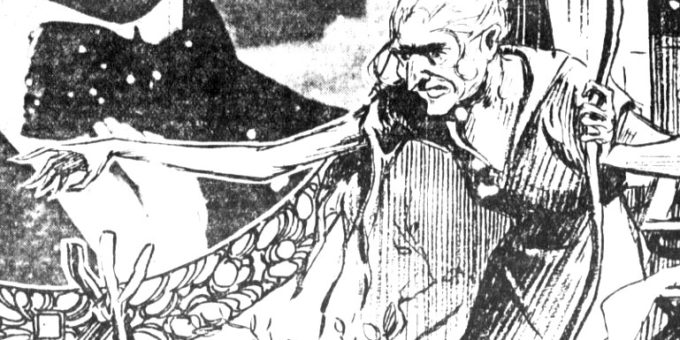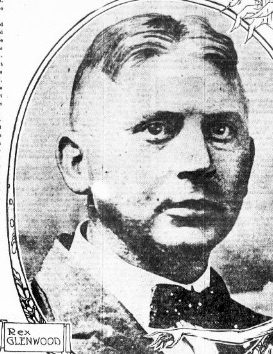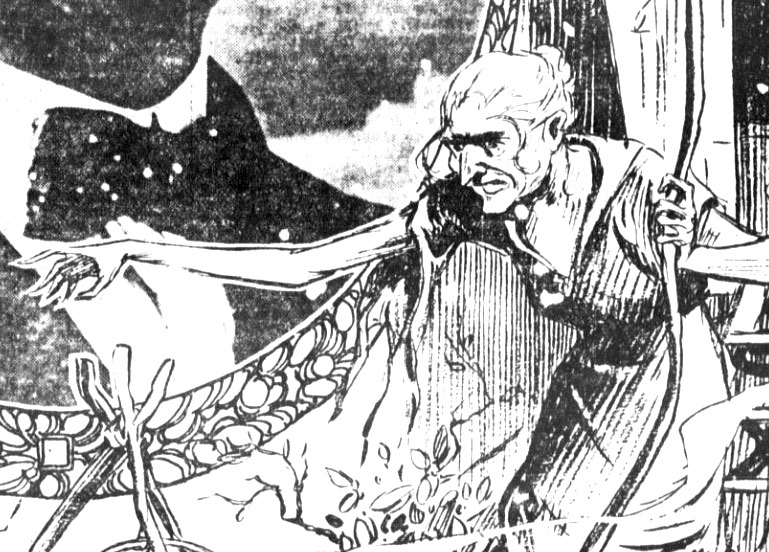
Edward was bathing in the Ohio River when he was overcome with cramps. Fortunately, he was saved from drowning by another man, but then a strange series of events took place that ended with two name changes and two strange stories.
Two Men Trade Names to Dodge Gypsy’s Curse

Edward A. Strietback had the courts change his name to Rex Glanwood; now by due process of law he is having it transformed into Nicholas Merrijune – all because of a gypsy’s curse.
Either this young man, who is a clerk in the employ of the Standard Publishing Company in Cincinnati, is spoofing the lady with the scales of even-handed justice and the sword of execution or else he has had an experience in the realms of superstition that deserves to rank as unique.
Listen:
In the summer of 1916, according to the legal papers he has filed through his attorney in the Probate Court of Hamilton County, he was taken with cramps while bathing in the Ohio River at the foot of Carrel Street in Cincinnati and would have drowned but for the quick action of a man who happened to be rowing a skiff nearby. This man, a grimy strange, apparently a tramp, threw a rope to the struggling Strietback and drew him ashore.
Overflowing with gratitude, Strietback asked the stranger how he could repay him for saving his life.
“By discarding your name and taking mine,” replied the man.
Strietback regarded him in amazement. Apparently the stranger had spoken in all seriousness. Any idea that might still linger in Strietback’s mind that he was joking disappeared as the fellow went on to tell the reason of his strange proposal.
Some years before, the stranger said, he had been married, established in business in a distant community and prosperous. Through some mischance he incurred the enmity of a gypsy, who for revenge placed a curse upon him and informed him that he would have nothing but constantly recurring ill-luck. He did have ill-luck – oodles of it. His wife died, his home burned, then his place of business was swept away by fire, and he was reduced to abject poverty, a condition in which he remained at the time chance placed it within his power to save the life of Strietback.

In desperation, according to the stranger’s story, he hunted up the gypsy and begged him to lift the curse. The gypsy, mollified by the misfortunes which had overtaken the other, seemed willing to have the jinx diverted, but said there was only one way in which the curse could be lifted and that would be by having some one take the stranger’s name by legal process. If that were done, the gypsy explained, the stranger would be relieved of the spell of the devastating black magic and, what seemed highly important to Strietback, the curse would not follow the name.
Strietback consented to take the stranger’s name – Rex Glenwood. The man warned him, however, that, for certain reasons concerned with the exercise of black art, the change must not be made at once, but a year thence. Strietbacl consented to that, too, and the ywo young men so strangely met went each his way.
The publisher’s clerk was as good as his word. Waiting the prescribed year, he went before the Probate Court on Sept. 12, 1917, and had his name legally changed to Rex Glenwood. That moniker seemed to fit him as well as his old one, and, as the years rolled on, the young man, who was without relatives or close friends in Cincinnati, also forgot that he ever had been known as Strietback.
Then a surprising thing happened. One day a few weeks ago Glenwood met on the street in Cincinnati the man who had wished the name on him. The stranger was greatly changed. He was no longer the grimy tramp. Now he was fashionably dressed, prosperous looking. He explained that the shifting of the curse had worked, that he had sidestepped the jinx and had emerged again into the land of milk and honey. A relative had died and let him a pot of money and he had married again and was supremely happy – in a state of bliss marred only by the compunctions of conscience.
The stranger went on to explain that he had lied in a measure about the curse business and that it was to correct the evil consequences of that lie that he had returned to Cincinnati.
“My name,” said the stranger, “is not Glenwood and never was. I lied to you when I told you it was. I came back here expressly to find you and release you from your pact and to advise you to change your name again.

“What I told you about the gypsy’s curse was true except that she did not tell me that I could be relieved of the curse only by getting some one else to take my name. What she did say was that if I would invent some name and put a curse on it, wishing the curse on with the proper emphasis and then get some one else to adopt that name, the curse would leave me and follow the name I had selected.”
Glenwood rather blenched at that, for he had not bargained on taking on a curse. Suppressing his indignation, however, and reflecting that if a jinx had been wished on him it had not got to going yet, for no misfortune had befallen him, he bade the mysterious stranger proceed with his tale.
“The reason I told you to wait a year before taking the name of Rex Glenwood,” the former curse-owner went on, “ was because I wanted to be sure of effectively fixing the curse on you in accordance with the gypsy’s directions. I figured that a year ought to be ample time for getting it properly set. I spent that entire year cursing the name of Rex Glenwood. I cursed it for breakfast, dinner, and supper, on going to bed and on getting up, and constantly between times. Whenever I had nothing else to do I would concentrate with all my mental power and curse the name of Glenwood.
“Now,” the stranger concluded, “the gypsy told me that if at any time within five years the man who had assumed the name I had wished the curse on should again change his name the curse would lose all its potency and would be at an end for all time. That is why I have hunted you up – to put you wise so you may change your name again and evade the curse.”
Saying which, the stranger turned on his heel and disappeared.
Five years! The time would be up Sept. 12, 1922. No time to lose! So thought Glenwood. He told his story to G.A. Ginter, a Cincinnati attorney, who filed an application for the change of name in the Probate Court. This application must be published at certain prescribed intervals for thirty days, at the end of which time, if no good reason be presented to forbid, Glenwood will be entitled to use his new moniker.
That name is Nicholas Merrijune.
“Nicholas came easy enough,” Glenwood explained. “I always did like that name. It has a sort of classy sound. For a time, however, I was up against it for a surname. Then one day I heard somebody say something about the merry month of June, and it came to me just like that – Merrijune.”
“Are you superstitious?” a nosey reporter asked Mr. Glenwood.
“Not a bit,” replied the young man sporting a curse.
“Then why are you having your name changed again?”
“I just want to be on the safe side.”
All this sounds like a folk tale of the Middle Ages. If anyone doubts its 1922 authenticity he will find it all set down in the records of the Hamilton County Probate Court.
“In this enlightened age it seems impossible that such superstition should exist,” said William H. Lueders, Judge of that court.
Source: The evening world. (New York, N.Y.), 12 July 1922.

